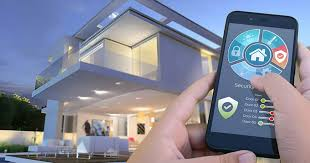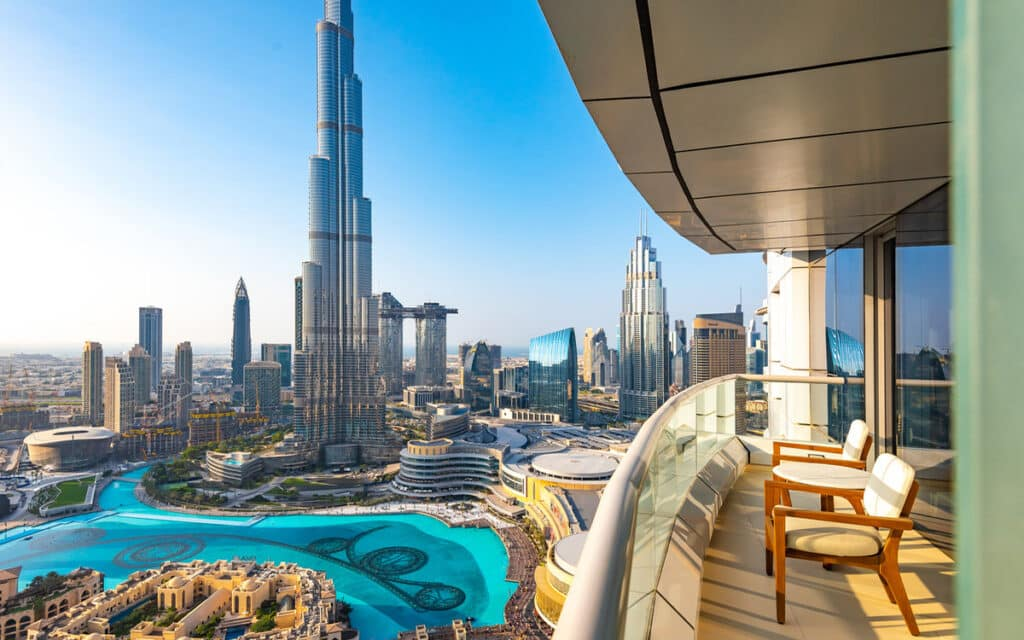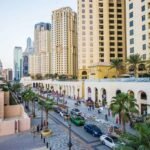Now Reading: Smart Home Integration Leading Dubai’s 2025 Real Estate Innovations
-
01
Smart Home Integration Leading Dubai’s 2025 Real Estate Innovations
Smart Home Integration Leading Dubai’s 2025 Real Estate Innovations

Table of Contents
Imagine walking into your Dubai villa, where your smart home senses your arrival, adjusts the lighting to a warm glow, and cues a calming playlist as you sink into a sofa with a view of the glittering skyline. Your AI assistant schedules a workout in your private gym, optimizes energy use, and monitors air quality, all while you relax on a terrace with a smart irrigation garden. In 2025, smart home integration is at the forefront of Dubai’s real estate innovations, with developments like Dubai Hills Estate, Emaar South, and Dubai Marina embedding cutting-edge technology into luxurious residences.
These projects are driving Dubai’s property boom, with 96,000 transactions worth $87 billion in the first half, 58% fueled by buyers from the UK, India, Russia, and China. Offering 100% freehold ownership, a dirham pegged to the U.S. dollar, and no personal income tax, capital gains tax, or annual property taxes, these properties—priced from $1 million to $8 million deliver 6-8% rental yields and 8-12% price appreciation, outpacing London (2-4%) and New York (2-3%).
Properties over $545,000 qualify for a 10-year Golden Visa, while smaller units grant 2-year residency. Powered by 25 million tourists and a 4% population surge, these tech-driven homes blend AI systems, wellness features, and sustainable designs to create residences that are as lucrative as they are futuristic. Navigating fees, VAT, and 2025 regulations is key to securing your place in these radiant smart havens.
Smart Technology Redefining Urban Living
Dubai’s 2025 real estate market is embracing smart home integration, with communities like Dubai Marina and Emaar South offering residences equipped with AI-driven systems for lighting, climate control, and security. With vacancy rates of 1-3% compared to 7-10% globally, a $2 million Dubai Hills Estate villa yields $120,000-$160,000 annually, tax-free, saving $44,400-$72,000 versus the U.S. (37%) or UK (45%).
Selling for $2.4 million (20% appreciation) delivers a $400,000 tax-free profit, saving $80,000-$112,000 compared to London (20-28%) or New York (20-37%). No property taxes save $20,000-$80,000 yearly, unlike London’s council tax (up to 2%) or New York’s property tax (1-2%). Residential purchases skip 5% VAT ($50,000-$400,000), and smart features like IoT-enabled appliances and voice-activated concierges drive 8-12% price growth. These tech-savvy homes attract buyers from the UK, India, and China seeking connected, luxurious living.
Living here feels like stepping into a radiant, futuristic embrace.
AI-Driven Wellness and Comfort
Smart homes in Dubai integrate wellness-focused technology, with developments like Dubai Hills Estate offering AI systems that monitor air quality, track sleep patterns, and suggest personalized fitness routines. These $1 million-$8 million properties yield $60,000-$480,000 annually, tax-free, saving $22,200-$216,000 compared to taxed markets. Short-term rentals, boosted by 25 million tourists visiting tech-driven communities, require a DTCM license ($408-$816), increasing yields by 10-15% ($6,000-$72,000).
Long-term leases, popular with professionals near business hubs like DIFC, need Ejari registration ($54-$136). Non-compliance risks fines up to $13,612, so licensing is essential. Features like smart gyms and meditation apps enhance appeal, with 85-90% occupancy rates driven by demand for healthful, connected living. A 4% DLD fee ($40,000-$320,000), often split, applies, but zero capital gains tax saves $48,000-$480,000 on $240,000-$2.4 million profits.
Smart wellness feels like a seamless blend of health and innovation.
Sustainable Smart Designs for a Greener Future
Sustainability is a key pillar of Dubai’s 2025 smart homes, with Emaar South and Dubai Marina featuring solar panels, smart irrigation, and energy-efficient systems aligned with Dubai’s net-zero goals by 2050. These $1 million-$8 million properties yield $60,000-$480,000 annually, tax-free, saving $22,200-$216,000. No property taxes save $10,000-$80,000 yearly, and VAT exemptions save $50,000-$400,000 on purchases. Maintenance fees ($10,000-$50,000) cover eco-friendly amenities like green roofs and smart energy monitors. Selling a $1 million apartment for $1.2 million yields a $200,000 tax-free profit, saving $40,000-$56,000 versus London or New York. With 8-12% price growth driven by eco-conscious buyers, these communities attract global investors seeking sustainable, tech-driven luxury.
Sustainable smart homes feel like a vibrant step toward a greener future.
No Personal Income Tax: Rentals That Thrive
Dubai’s no personal income tax policy lets you keep 100% of rental income, unlike the U.S. (up to 37%) or UK (up to 45%). A $1 million Emaar South apartment yields $60,000-$80,000, saving $22,200-$36,000; an $8 million Dubai Marina villa yields $360,000-$480,000, saving $162,000-$216,000. Short-term rentals, fueled by tourists visiting smart community events, require a DTCM license ($408-$816), boosting yields by 10-15%. Long-term leases, ideal for families or professionals, need Ejari registration ($54-$136). A 5% municipality fee on rentals ($3,000-$24,000) applies, but non-compliance risks fines up to $13,612. Smart features like AI concierges and energy monitors enhance rental appeal, driving 85-90% occupancy in 2025.
Tax-free rentals feel like a refreshing wave of prosperity.
Zero Capital Gains Tax: Profits That Soar
Zero capital gains tax lets you keep 100% of sale profits. Selling a $1.5 million Dubai Hills Estate apartment for $1.8 million yields a $300,000 tax-free profit, saving $60,000-$84,000 versus London (20-28%) or New York (20-37%). An $8 million Dubai Marina villa sold for $9.6 million delivers a $1.6 million tax-free gain, saving $320,000-$448,000. With 8-12% price growth driven by smart technology and sustainability, these properties outperform global markets, where similar homes rarely exceed $5 million. A 4% DLD fee ($40,000-$320,000), often split, applies, but tax-free profits make these homes wealth-building powerhouses.
Keeping every dirham feels like a radiant financial triumph.
No Annual Property Taxes: Ownership That Feels Light
Unlike global markets, Dubai imposes no annual property taxes, saving $10,000-$80,000 yearly on $1 million-$8 million properties compared to London’s council tax ($20,000-$160,000) or New York’s property tax (1-2%). Maintenance fees ($10,000-$50,000) cover smart security, green spaces, and 24/7 concierge, aligning with global luxury standards. A 5% municipality fee on rentals ($3,000-$24,000) is reasonable for these prime locations. These low costs make ownership sustainable, supporting a lifestyle that feels modern and effortless, perfectly suited to 2025’s tech-driven vision.
No property taxes feel like a gentle breeze lifting your investment.
VAT Rules: A Savvy Investor’s Edge

Residential purchases skip 5% VAT, saving $50,000-$400,000 on $1 million-$8 million properties, unlike commercial properties or the UK’s stamp duty (up to 12%, or $120,000-$960,000). Off-plan purchases incur 5% VAT on developer fees ($10,000-$80,000), recoverable via Federal Tax Authority (FTA) registration ($500-$1,000). Short-term rental operators must register for VAT if revenue exceeds $102,041, charging 5% but claiming credits on DTCM fees ($408-$816). A $1 million apartment yielding $60,000-$80,000 incurs $3,000-$4,000 in VAT, with $1,000-$1,500 in credits; an $8 million villa yielding $360,000-$480,000 incurs $18,000-$24,000 in VAT, with $2,000-$3,000 in credits. Non-compliance risks fines up to $13,612, so meticulous records are key.
VAT exemptions feel like a clever boost to your savings.
DLD Fees and Title Deeds: Securing Your Smart Haven
The 4% DLD fee, typically split, applies: $40,000 for a $1 million apartment or $320,000 for an $8 million villa. Gift transfers to family or shareholders reduce DLD to 0.125%, saving $38,750-$310,000. For example, gifting an $8 million villa cuts DLD from $320,000 to $10,000. Title deed issuance costs $136-$272, requiring DLD registration. Broker fees, typically 2% ($20,000-$160,000), may be waived for off-plan projects. Mortgage registration (0.25% of the loan, or $2,500-$20,000) and valuation fees ($680-$1,360) apply for financed deals. The 2025 Oqood system ensures escrow compliance for off-plan purchases, protecting your investment.
Title deeds feel like the key to your futuristic sanctuary.
Corporate Tax: A Business Buyer’s Note
Introduced in 2023, the 9% corporate tax applies to businesses with profits over $102,110. A company leasing a $1 million apartment yielding $60,000-$80,000 faces a 9% tax ($5,400-$7,200), reducing net income to $54,600-$72,800. An $8 million villa yielding $360,000-$480,000 incurs $32,400-$43,200 in tax. Qualified Free Zone Person (QFZP) status in areas like DMCC avoids this, saving $5,400-$43,200, with setup costs of $2,000-$5,000. Small business relief waives corporate tax for revenues under $816,000 until December 31, 2026. Individual ownership skips this tax, ideal for most buyers.
Corporate tax feels like a soft ripple you can navigate.
New Tax Rules for 2025
The Domestic Minimum Top-up Tax (DMTT), effective January 1, 2025, imposes a 15% tax on multinationals with revenues over €750 million ($793 million). Individual investors and smaller entities are unaffected, and QFZP status avoids DMTT, saving $5,400-$72,000. Cabinet Decision No. 34 refines Qualifying Investment Fund (QIF) rules, exempting corporate tax if real estate income is below 10%.
A QIF earning $1 million, with $100,000 from rentals, faces 9% tax ($8,100) on 90% ($900,000). A July 2025 policy allows corporate tax deductions on fair market value depreciation, saving $1,818-$14,545 annually for a $1 million apartment revalued at $1.2 million. These rules enhance the appeal of Dubai’s smart homes.
New tax rules feel like a puzzle with prosperous solutions.
Top Smart Home Communities in 2025
1. Dubai Hills Estate: Wellness-Tech Haven
Dubai Hills Estate ($1.5 million-$5 million) offers 6-8% yields and 8-12% price growth, featuring villas with AI-driven wellness systems and green spaces. A $2 million villa yields $120,000-$160,000 tax-free, saving $44,400-$72,000. Selling for $2.4 million yields a $400,000 tax-free profit, saving $80,000-$112,000. No property taxes save $20,000-$50,000, and VAT exemption saves $75,000-$250,000. Maintenance fees are $12,000-$35,000, with a 5% municipality fee ($6,000-$8,000). QFZP saves $10,800-$14,400. U.S. investors deduct depreciation ($36,364-$90,909), saving up to $31,818. Its wellness-tech appeal attracts UK and Indian buyers.
Dubai Hills Estate feels like a radiant, connected sanctuary.
2. Emaar South: Sustainable Smart Oasis
Emaar South ($1 million-$3 million) offers 6-8% yields and 8-12% price growth, featuring residences with smart energy monitors and eco-designs. A $1 million apartment yields $60,000-$80,000 tax-free, saving $22,200-$36,000. Selling for $1.2 million yields a $200,000 tax-free profit, saving $40,000-$56,000. No property taxes save $10,000-$30,000, and VAT exemption saves $50,000-$150,000. Maintenance fees are $10,000-$25,000, with a 5% municipality fee ($3,000-$4,000). QFZP saves $5,400-$7,200. U.S. investors deduct depreciation ($18,182-$54,545), saving up to $19,091. Its sustainable tech draws Chinese and Russian buyers.
Emaar South feels like a vibrant, eco-smart retreat.
3. Dubai Marina: Urban Tech Hub
Dubai Marina ($1 million-$8 million) offers 6-8% yields and 8-12% price growth, featuring villas with smart systems and waterfront views. A $5 million villa yields $300,000-$400,000 tax-free, saving $111,000-$180,000. Selling for $6 million yields a $1 million tax-free profit, saving $200,000-$280,000. No property taxes save $50,000-$80,000, and VAT exemption saves $50,000-$400,000. Maintenance fees are $10,000-$50,000, with a 5% municipality fee ($15,000-$20,000). QFZP saves $27,000-$36,000. U.S. investors deduct depreciation ($90,909-$145,455), saving up to $50,909. Its urban tech allure attracts global professionals.
Dubai Marina feels like a dynamic, tech-driven oasis.
Why These Smart Homes Shine
Price Range: Emaar South ($1 million-$3 million) suits mid-range buyers; Dubai Hills Estate ($1.5 million-$5 million) and Dubai Marina ($1 million-$8 million) target mid-to-high-end investors.
Rental Yields: 6-8%, with Dubai Marina at 6-8% for short-term rentals; others at 6-7% for stable leases.
Price Appreciation: 8-12%, driven by smart technology and sustainability.
Lifestyle: AI systems, wellness hubs, and eco-designs create futuristic living.
Amenities: Smart gyms, energy monitors, and concierges enhance appeal.
ROI Verdict: 8-12% ROI, blending tech with stellar returns.
Investing here feels like embracing a radiant, futuristic legacy.
Strategies to Maximize Returns
For individuals: Hold properties personally to avoid corporate taxes, saving $5,400-$43,200. Negotiate DLD fee splits, saving $20,000-$160,000. Use gift transfers to reduce DLD to 0.125%, saving $38,750-$310,000. Recover 5% VAT on developer fees via FTA registration ($500-$1,000). Leverage double taxation treaties with 130+ countries, saving $22,200-$216,000. U.S. investors deduct depreciation ($18,182-$145,455), saving up to $50,909.
For corporates: Secure QFZP status, keep QIF income below 10%, and claim depreciation deductions. Hire property managers ($10,000-$50,000 annually) and tax professionals ($1,000-$3,000) to avoid fines up to $136,125. Focus on short-term rentals in Dubai Marina, long-term in Emaar South.
These strategies feel like a roadmap to your tech-driven wealth.
Risks to Watch in 2025

A projected oversupply of 182,000 units by 2026 may slightly slow price growth in newer Emaar South phases, but Dubai Hills Estate and Dubai Marina remain resilient due to their established appeal. Off-plan delays risk setbacks, so choose trusted developers like Emaar and verify escrow compliance via the 2025 Oqood system. Non-compliance with VAT or DTCM rules risks fines up to $13,612, and corporate tax errors can cost $136,125. Indian investors must report properties in India’s Foreign Asset schedule to avoid $135,000 penalties. Currency fluctuations, though minimal with the dollar peg, could impact returns.
Why Smart Homes Are Worth It
With 8-12% ROI, 8-12% growth, and tax-free savings of $10,000-$480,000 annually, Dubai’s smart homes Dubai Hills Estate, Emaar South, and Dubai Marina offer futuristic residences, tech-driven amenities, and global appeal. Golden Visa perks, 85-90% rental occupancy, and a lifestyle blending innovation with profitability make them 2025 investment gems. Navigate fees, secure your smart haven, and invest in Dubai’s radiant future.
read more: Island Resorts With Freehold Property Options Emerging Across Dubai






















